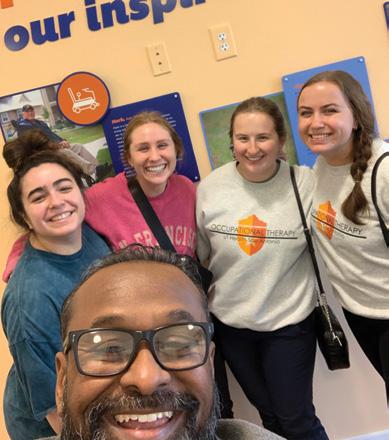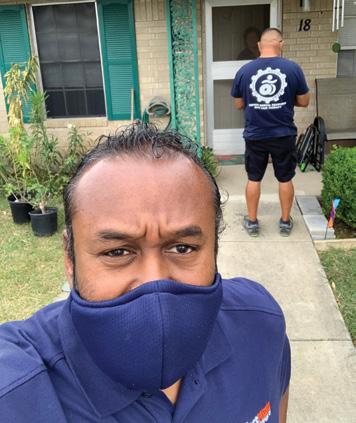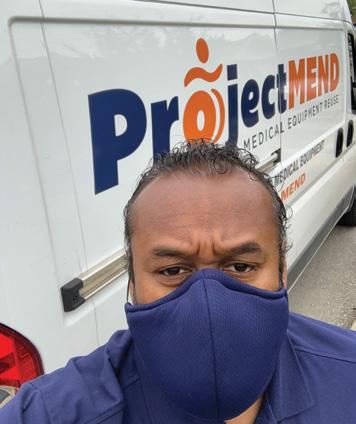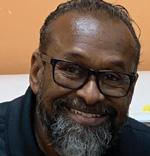
6 minute read
MINI FEATURE
PROJECT MEND PUTS MEDICAL EQUIPMENT IN HANDS OF THOSE WHO NEED IT MOST
Written by: DOUG HENSLEY
Advertisement
Project MEND started as a great idea in San Antonio but over the years has become something of a nonprofit force as its influence has stretched far and wide.
The concept is simple. The organization takes donations of gently used medical equipment, upcycles it, sanitizes it and then makes it available to someone in need.
“When it comes to durable medical equipment (DME You name it, we take it, as long as it helps someone with a mobility issue,” said Dexter Moon, the organization’s chief operations officer. “Our technicians go through it and make sure it is mechanically sound. We have a list of clients who have a need, and we issue it. You would be surprised by the number of people who have no access to this type of equipment.”

Providing a child from Acunia, Mexico, a custom chair on a recent trip to Del Rio, Texas.
Project MEND was founded in 1992 by Murlin Johnson, and a year later it was incorporated as a 501(c)3 nonprofit organization as a medical equipment network for those with disabilities, particularly home medical equipment and assistive technology. (To learn more, visit www.projectmend.org)
Moon had a firsthand view of life-changing work done by Project MEND while serving on its board of directors. With a background in logistics, he was awestruck by how the organization executed its mission.
“This is medical logistics at its best,” he said. “I feel that many of us have time, talent and treasure, and having an opportunity to connect with an organization fulfilling a community need is important. There are a lot of them out there doing great things, but I felt connected to this particular organization and what it was doing.”
As a prior board member and chair, Moon helped craft Project MEND’s vision and strategic mission, but after he retired, the organization needed a chief operations officer. “It was the perfect opportunity to walk into a second career and serve others.”
Moon also has had personal experiences with Project MEND as his mother-in-law and his mother have benefited from the organization’s efforts.
“We don’t realize what we don’t have and what we need until we don’t have it and we need it,” he said.

Taking a selfie with some volunteer OT students that volunteer their time to help sanitize DME at our State-of-the-Art facility.
Project MEND has the people and the processes in place to make a difference in people’s lives almost every day, whether that’s in the greater San Antonio area or points near and far away. It does all of this work with a current staff of 13 (they are working to fill an existing opening).
“Annually, we serve somewhere between 1,400 and 1,700 people a year,” he said. “At any given time, we have tons of need. But we are also donation-based, so it’s not only whether we have a piece of equipment in our inventory, it has to be the right equipment. We have powerchairs and wheelchairs, but someone may need a 20-inch wheelchair and we have a 16-inch. It has to be the right wheelchair for the right client to make their recovery and situation better.”
There’s a lot of hard work and a little bit of magic involved in what Project MEND does. There are specific parts of the operation that function together to ensure operational efficiency.
“On the warehouse operations side of the house, we have four team members,” Moon explained. “We have one who is dedicated to repairs and two dedicated drivers who go, pick up and deliver donations because we offer delivery as well as pickup. Then we have one inventory specialist who manages all of our on hand inventory.”
That’s how the equipment gets to and from Project MEND. Then there’s the program side where our program manager and three client managers work with clients, occupational therapists, physical therapists and case workers throughout the city in identifying clients with needs.
Of course, it takes capital to make the organization’s engine work, so Project MEND has a person who works as chief development officer and a grant writer. Project MEND’s program manager works with clients and does community outreach to build awareness around the Project MEND brand. Staff work with assisted living centers, nursing homes and other facilities who may have equipment in storage that is no longer being used but that could be upcycled for a client. Project MEND’s chief executive officer, Cathy Valdez, oversees everything along with a committed board of directors.

Conducting a home delivery during COVID.

Conducting a home delivery during COVID.
That’s the more visible side of things.
“On the warehouse side, we take donations a few ways,” he said. “You can call us, and we will schedule a pickup. You can go online to our site and donate through our portal. We then work with our drivers to go out and get the donations.”
Picking up the donations is only half of it. Everything has to be sanitized to state regulations before it can be sent out for someone else to use. In January 2022, the entire Project MEND operation moved to a state-ofthe-art facility that had more than 16,000 square feet.
“We could use some more room,” Moon said with a smile. “The building was designed specifically for us to expand later on where it can meet our processes as we continue to grow.”
Project MEND is licensed and certified by the state to do the work it does. “That means equipment that comes in is considered donated and not sanitized,”
Moon said. “Once we upcycle it, we sanitize it to state standards so it is reissued safely and securely.”
Moon said 99% of donated equipment arrives with some type of biohazard material on it, making the sanitizing process critical.
“If we’re able to, we hand-sanitize it to begin with,” he said. “Then we put it in our hub scrub, a machine that disinfects nonelectrical items, and then we hand-sanitize it again before it moves into our inventory. Then, before it goes out the door, we shoot it with another disinfecting system that hits it with ultraviolet light, which kills 99.9% of any biohazard that might have been missed. When it goes out our door, it’s safe.”
Moon said it has been especially rewarding to see how Project MEND’s footprint of impact has continued to expand through the years.
“Although we serve San Antonio and 34 surrounding counties, when we repurpose equipment and work with partners, it has been sent as far away as Africa and Mexico as well as other states. We work with a lot of partners to make sure this equipment winds up in someone’s hands locally or has a far-reaching touch. It’s part of why I love what I do.”
CONTACT
Dexter may be reached at DEXTER.MOON@PROJECTMEND.ORG

Dexter Moon is the chief operations officer for Project Mend. He is based in San Antonio, Texas.





